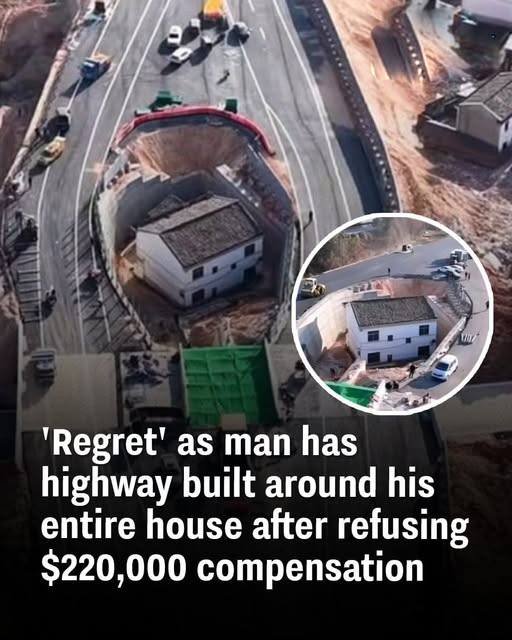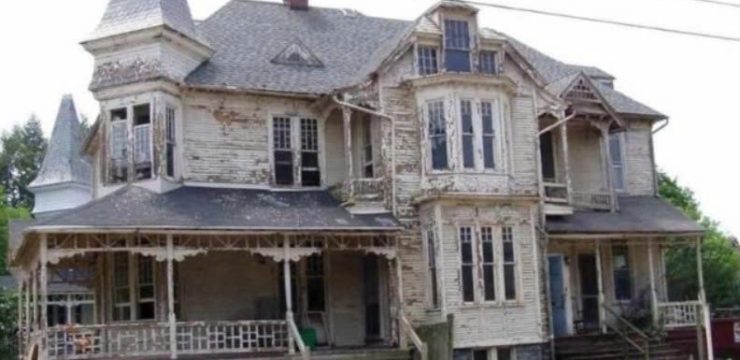In China, a growing trend known as the “nail house” phenomenon is drawing widespread attention. These are homes where the owners refuse to sell or relocate, even when faced with heavy pressure from developers or government construction plans.

The term “nail house” comes from how these properties stick out like a stubborn nail that won’t be hammered down, standing alone while massive infrastructure projects rise around them. It’s become a powerful symbol of personal resistance in modern China, where land ownership and property rights remain a complicated issue. While China abolished private land ownership decades ago, the introduction of a modern property law in 2007 gave homeowners slightly more legal leverage.
Still, when the government decides that land is needed for a public project, it often has the final say, as demonstrated by the situation facing one man in Jiangxi Province. Ye Yushou, a tofu vendor from Jinxi County, has become the latest face of this controversial issue. His two-story home is now completely surrounded by the newly built G206 highway. In 2022, the government offered him compensation totaling 1.6 million yuan—around $220,000—and two replacement homes. Yushou rejected the deal, demanding instead 2 million yuan and three homes, believing his property was worth more. But the authorities refused to meet his higher demands.
Rather than prolonging negotiations, they simply moved forward with construction, routing the highway around his house and leaving it stranded in the middle of a busy road. The scene is almost surreal. Yushou’s home, now known as “The Eye of Jinxi,” sits isolated in the center of an active highway. Surrounded by lanes of traffic on all sides, the once ordinary home has turned into an urban oddity.
The government did build a narrow access path so Yushou can enter and exit, but his house is boxed in by a noisy, dusty construction zone that has now opened to live traffic. As vehicles zoom past his home daily, Yushou is beginning to regret his decision. Speaking to curious onlookers who stop to snap pictures or ask questions, he has openly admitted, “I asked for more, and now I’m stuck.” He revealed that he spent more than $14,000 on legal fees, hiring a lawyer from Beijing to negotiate a better settlement, but that effort ultimately failed to yield any return. In contrast, three of his neighbors accepted the original compensation offer. Their homes were demolished, and they moved on with their lives. At least one of them reportedly became a millionaire thanks to the deal. Meanwhile, Yushou remains, his house surrounded by a $63 million highway and filled with the constant rumble of traffic. Public reaction has been divided. Some people admire his determination to stand his ground, seeing him as a man who stood up to the system. Others believe he let pride or greed cloud his judgment and missed out on a fair deal. One commenter on Reddit remarked, “He thought they couldn’t build the highway without buying his house. He got greedy and found out the hard way.” Another added, “I respect the principle, but I can’t imagine living in the middle of a highway. That’s got to be terrifying every time a truck speeds by.” Someone else even compared the situation to the movie Up, joking, “Grandpa’s probably preparing the balloons as we speak.” Whether viewed as a cautionary tale or a symbol of defiance, Ye Yushou’s story is now permanently tied to this massive infrastructure project. His decision to hold out has become a literal landmark—his house a physical reminder that sometimes waiting for more doesn’t bring a bigger reward. Instead of walking away with a generous compensation package and a fresh start, he now lives in isolation, surrounded by endless traffic and filled with second thoughts. The highway may have moved forward, but for Ye Yushou, time seems to have stood still, with regret echoing louder than the cars speeding past his front door.





